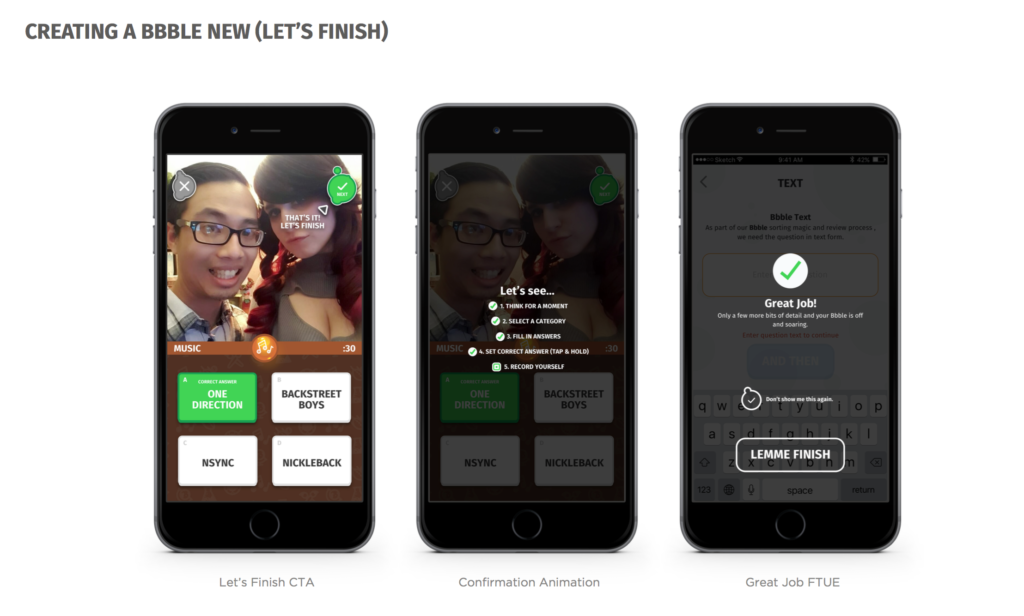Privately funded Los Angeles startup 1-800-N0TH1NG is a new media innovation lab founded by former BitTorrent content chief, Matt Mason. The company has been working on a number of apps and games, as well as a live video game competition designed for today’s livestreaming audience. Mason told [a]listdaily that his team is exploring how game mechanics can be applied to help people play, connect and create at scale.
Their first product, Bbble (pronounced ‘bubble’), launches today for iOS. Mason said the social video game separates itself from the many text-based trivia games on the market by allowing anyone to star as the host by snapping their own video questions. In today’s YouTube and Twitch landscape, Mason believes allowing players to star as next generation game show hosts will pave the way for new opportunities for brands. Over 300 people have already uploaded trivia content during the game’s beta period.
“As a company, we’re not developing anything we can’t monetize through in-app purchases or advertising,” said Mason. “There are some easy ways to monetize a lot of these apps, but I’m more interested in the harder way to monetize, which usually means better results for the brand.”
Mason said baking in sponsored trivia questions so people can actively engage with brands is one example that Bbble opens up. Conversations have started with brands about connecting with this new game’s audience, and Mason said prizing will be added in the near future.
“We thought a lot about that and how that’s going to be a good experience for the user and bring real engagement for the brand,” Mason said, discussing brand integration. “We try to think about the user experience first, and explore brand integrations from the beginning of everything we do. The days of just inserting ads into apps are numbered. We’ll put video ads in our apps where it’s appropriate, but we’re interested in doing things that haven’t been done before.”
Mason said his company will launch at least one new app, and possibly have two others out, by the end of this year. The company is also developing several apps for 2017.
Separate from its video game business, Mason is also exploring other ways to connect brands with gamers. His company launched a live action first-person shooter video game experiment called RoboKong on July 30, which allowed players to take control of a super soldier who is part man and part machine. Over 1,500 players signed up to participate and the four-hour game featured 18 contestants. The average playing time was five minutes, and the only player to beat the game was the very last participant.
“The thinking behind RoboKong was to look at people recreating video games and putting those funny videos up on YouTube or Reddit,” Mason said. “We wanted to see if we could do something like that and do it live and entertain fans.”
Using Twitch, YouTube Gaming, Facebook Live, Periscope and other live broadcast platforms, players were able to direct a character named RoboKong, played by a live actor, as he attempts to escape from a lab filled with rogue mutants. With little marketing, the live show attracted 700,000 views over four hours, generating 4 million brand impressions and more than 26,000 fan messages. The three most shared messages by fans on Twitch were: “LOL,” “lol” and “lul.”
“We knew it’d be a hit with the gaming audience, but it was also a hit with people who aren’t eSports fans or Twitch viewers,” Mason said. “Because it’s live action and a parody of video gaming, people who aren’t fans of games but who have been exposed to games found it funny. It felt more like a live sport in that you could watch along and have an opinion of what the player should do next. It’s very different than eSports, where it’s hard to anticipate what’s going to happen with Overwatch, Halo or Call of Duty when you have so much information coming at you at once. Games are designed for instantaneous response for the gamer, but if you’re not tuned into the rules of the game, it can be hard to follow.”
Now that the trial succeeded, Mason said the goal is to have a second RoboKong air in Q1. And there’s the potential to turn this into a series with eight to ten episodes in the future.
“We believe this is something we can build a sponsorship around and build out to be sustainable,” Mason said. “We’re attracting sports fans. It’s slower than a video game, but it just looks like a video game. We’re interested in pushing on that and expanding the franchise.”

